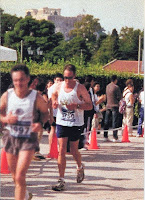
I was eating a piece of crabapple bread (yes, crabapples again) when suddenly I thought of Miss Ella, my kindergarten teacher in Leitchfield, Kentucky. Miss Ella taught me left from right, taught me how to plant a garden and brush my teeth. I learned to read, sitting in Miss Ella's lap. I remember vividly when I pointed to a "W" and she sounded out "Wagon" and suddenly all the letters formed words and the words made a story.
We planted a garden while we were acting out the story of the Little Red Hen, who asks everyone to help her, but winds up doing everything herself. At the end of the story, she eats the bread (made from wheat, made from grain she planted) all by herself. Was the lesson self-sufficiency, or something else?
I never even knew Miss Ella's last name until by chance (if you believe in chance) an Internet contact sent me her obituary last year. I learned that Miss Ella was known for her frugality, growing gardens, raising chickens, and teaching five-year-olds. I suppose that next to my family, she must have been the most important person in my life, and yet I never had any contact with her after that one year.
It may not be much consolation to schoolteachers to realize that they're a bit like gravity in the lives of their students. If I could thank Miss Ella right now, I would.








